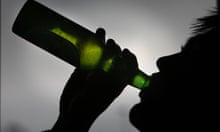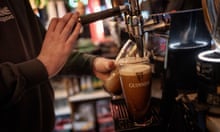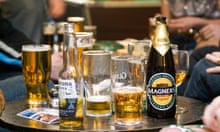One in 10 people in a hospital bed in the UK are alcohol-dependent and one in five are doing themselves harm by their drinking, according to research that quantifies for the first time the massive burden to the NHS of Britain’s drinking culture.
Hospitals are struggling to cope with the numbers of people whose heavy drinking habits land them in A&E or mental health units, but while the NHS estimates that the cost of treatment runs to £3.5bn a year, the figures for the numbers of patients affected have been largely anecdotal.
A major review pulling together the results of 124 previous studies involving 1.6 million hospital inpatients reveals that 20% use alcohol harmfully, for instance by binge drinking, while 10% are dependent on alcohol. Experts say alcohol services in the NHS and the community have been cut, leaving a health service fighting to cope.
“These numbers are shocking: the number of beds used, the cost to the NHS, the sheer number of people suffering as a result of alcohol,” said Dr Richard Piper, the chief executive of Alcohol Change UK, the campaign group behind Dry January.
“As dedicated alcohol treatment services have faced years of swingeing cuts, hospitals are being left to pick up the pieces – but most simply do not have the expertise or capacity to do so, resulting in alcohol problems going untreated and those suffering returning to hospital time and time again.”
The review, led by Dr Emmert Roberts from the Institute of Psychiatry, Psychology & Neuroscience at King’s College London and published in the journal Addiction, calls for all patients admitted to hospital to be screened for their alcohol use and for medical staff to be trained in how to diagnose and treat those abusing alcohol.
Roberts was “super-concerned” by the findings, if not astounded, because he had expected the worst. But his medical colleagues’ reaction was one of shock. “The fact that they are shocked says to me that we are underdiagnosing these people and not providing them with adequate treatment,” he said.
“The message needs to get out there that this is a very prevalent, very common condition, and unless we start treating these people, obviously we are going to keep on having a rise in alcohol-related hospital admissions.”
But, he said, the NHS was losing its expertise. “Unfortunately, there’s been a reduction in trained addiction psychiatrists in the UK over the last five years and a reduction in real-terms funding to community specialist alcohol treatment services, and because of that there’s been a large reduction in the knowledge base of the healthcare profession around alcohol and other substance abuses.”
The government had funded alcohol care teams in the 25% of hospitals that were worst affected. “We don’t think that’s enough. We think there should be alcohol specialists in 100% of hospitals given the magnitude of the problem. It’s a nationwide problem that needs a nationwide solution and not just cherrypicking,” he said.
Alcohol Change UK said alcohol care teams, working across hospital departments and with the community services, save lives and NHS money. “Public Health England estimates that a seven-day service of this kind in a hospital can save 2,000 bed days per year, creating a saving of £3.85 for every £1 invested,” said Piper.
But there is a need to stop people arriving in hospital, he said. “We must consider whole-population approaches, like minimum unit pricing and restrictions on alcohol marketing, to prevent harm before it happens. We must wake up to the unacceptable levels of suffering that alcohol is causing our society.”
Prof Sir Ian Gilmore, the chair of the Alcohol Health Alliance UK, said the figures were worrying. “More than 80 people die of alcohol-related causes across the UK every day, and there are more than 1m alcohol-related hospital admissions every year in England alone. This puts considerable pressure on the NHS, as well as other public services,” he said.
“We are urging the government to prioritise reducing the harm alcohol causes. The government needs to take action and introduce targeted, evidence-based measures, including minimum unit pricing, to raise the price of the cheapest, strongest alcohol products, which would help to tackle the alcohol-related harms people are experiencing.”
The World Cancer Research Fund pointed out that drinking alcohol increases the risk of six types of cancer, including breast and bowel cancer. “We have a social culture in the UK which can be very focused on alcohol,” said Kate Oldridge-Turner, its head of policy.
“We need the government to empower people to drink less by making our daily environments healthier and tackling this drinking culture, as information alone won’t lead to large scale change in behaviours,” she said, echoing the call for minimum unit pricing as well as “better urban planning that gives people more social spaces that do not revolve around alcohol”.
The NHS England chief executive, Simon Stevens, said: “Alcohol dependence can devastate families with the NHS often left to pick up the pieces, yet the right support can save lives. The NHS long-term plan will expand specialist alcohol care teams in hospitals across the country to tackle problem drinking and prevent 50,000 admissions over the next five years.”









